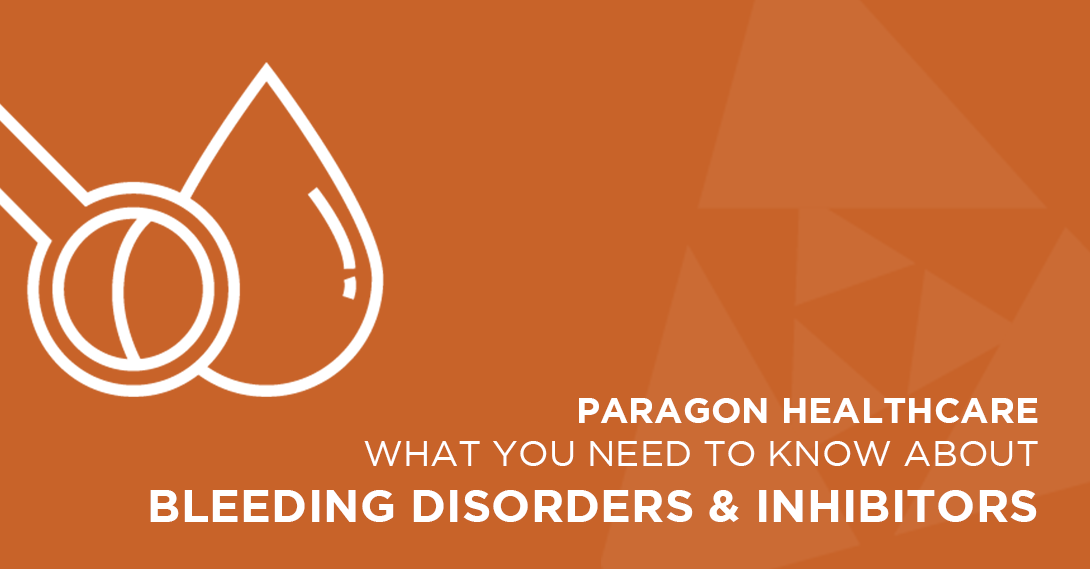While all bleeding disorders have a lot in common, such as some symptoms and the complications of bleeding, they are also all different. Here are some of the most common types of bleeding disorders:
- Hemophilia A (Factor VIII deficiency)
- Hemophilia B (Factor IX deficiency)
- Hemophilia C (Factor XI deficiency)
- von Willebrand Disease (types I, II, III, aVWS, and pseudo-VWD)
Each bleeding disorder comes with its own set of challenges and complications. One type of complication that bleeding disorder patients may face is the development of an inhibitor. Normally, the body’s immune system works to fight off bacteria, viruses, and other foreign substances that can cause illness. Sometimes, however, the immune system attacks the wrong target. Inhibitors (also called antibodies) occur when your body’s immune system targets factor replacement products. This will destroy the infused factor concentrate, as well as the factor produced naturally by the body. A person who doesn’t have inhibitors will heal from injuries or feel better soon after the factor concentrate is infused. Inhibitors do not affect the location, frequency, or severity of bleeds, but they do make them more difficult to control. A person with an inhibitor does not get better after receiving a dose of factor that is appropriate for their weight.
Who’s at Risk for Developing an Inhibitor?
Inhibitors are common in patients with hemophilia—they occur in 15% to 20% of people with hemophilia A (factor VIII [8] deficiency) and 2% to 5% of people with hemophilia B (factor IX [9] deficiency). They can also occur in people with other types of bleeding disorders too.
Since inhibitors usually occur within the first 50 days of exposure to treatment, they frequently develop during childhood. In people with mild hemophilia A, however, inhibitors often occur in or are not recognized until adulthood. Any person with a bleeding disorder can develop an inhibitor at any time, but it is usually in the first year or two of life. Having recently initiated treatment with factor replacement products can trigger the development of inhibitors but there are some other variables that can increase the risk of inhibitor development. A person is more likely to develop an inhibitor if they:
- Have hemophilia A rather than hemophilia B
- Have severe, rather than mild or moderate hemophilia
- Have a family history of inhibitor development
Measuring Inhibitors
People who have inhibitors are usually described as high responders or low responders.
- High Responders. Individuals are considered high responders if the amount of inhibitor in the blood increases quickly after factor is administered. This makes treatment with standard clotting factor difficult. High responders may need a different type of treatment, such as a bypassing agent and may need to undergo immune tolerance induction (ITI)
- Low Responders. Individuals are considered low responders if the amount of inhibitor does not increase after factor is administered. Low responders are usually able to use standard clotting factor treatment but may need to receive higher doses than standardly given or repeated doses. ITI is also used for low responders if the inhibitor does not go away on its own
Managing Inhibitors
Treating people with an inhibitor is complex and remains one of the biggest challenges in bleeding disorder care today. (Sometimes inhibitors occur for a short time and then disappear spontaneously. Inhibitors that persist can increase the risks associated with bleeding episodes because factor therapy becomes less effective.) After a new treatment schedule is established, the blood’s factor level must be measured to see if the inhibitor goes away. If feasible, a person with an inhibitor should be cared for under the supervision of a Hemophilia Treatment Center (HTC).
Some treatments for people with inhibitors include:
- High-dose clotting factor. People who have low-responding inhibitors may need larger amounts of clotting factor. Although some factor binds to the inhibitor and becomes inactive, enough is left to help form a clot
- Bypassing agents. Bypassing agents are used to treat bleeding in people with high-titer inhibitors. Instead of replacing the missing factor (factor VIII [8] or factor IX [9]), they go around (or bypass) the inhibitor to help the body form a normal clot. People taking bypassing agents should be monitored closely to make sure their blood is not clotting too much or clotting in a wrong place in the body
- Immune tolerance induction (ITI) therapy. The goal of ITI therapy is to stop the inhibitor reaction from happening. In a way, it teaches the body to accept clotting factor treatments. With ITI therapy, people receive large amounts of clotting factor every day for many weeks or months. ITI therapy requires specialized medical expertise, is costly, and may take a long time to work. In many cases, ITI does get rid of the inhibitor. But patients may need to continue taking frequent, large amounts of factor for many years to keep the inhibitor from coming back
At Paragon, we serve the bleeding disorder community as a specialty pharmacy that can ship factor, supplies, and medication to patients nearly anywhere in the United States. For more information about Paragon Hemophilia, visit our website at https://paragonhealthcare.com/hemo/.







